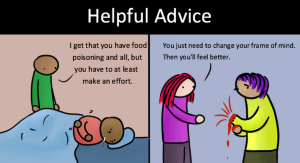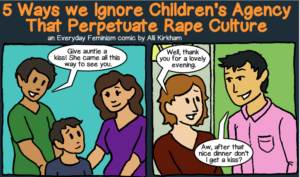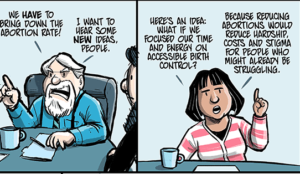
Source: WikiHow
At least 1-in-3 women will have an abortion in her lifetime, which means there’s a pretty high likelihood that at some point (if you haven’t already), you’ll have a friend who has an abortion or who at least considers this options.
And you may have one yourself — in which case, you can find that having the support of a friend can be really helpful as you navigate the process.
As one of the safest and most common medical procedures, obtaining an abortion shouldn’t be as hard as it is. Unfortunately, because of intense cultural stigma and barriers put in place that make abortion financially, legally, and physically difficult to access, obtaining an abortion can be an emotionally difficult process.
And so, this post is about being a good friend. It’s also about supporting someone through a process about which we are taught to be ashamed and silent.
Because while it’s necessary that we fight to end the stigma and political barriers around abortion access through public campaigns, at speak-outs and demonstrations, we can also bring that awareness to our personal interactions and relationships.
We are not taught how to speak to each other about abortion in a way that is healing and supportive.
In some ways, we can support a friend considering an abortion much like any other decision or process – by being kind, not judging, and so on. But in other ways, the abortion experience is unique, and it is important to consider ways you can support a friend who is considering or choosing to have an abortion.
1. Help Your Friend Find Accurate Information
Because there is such a gap in comprehensive information out there on abortion, it can be a serious challenge to find information that isn’t stigmatizing, shaming, or completely medically inaccurate.
Doing a Google search of “abortion” will bring up endless numbers of anti-abortion sites that claim to have the “real facts,” yet explain in incredibly violent and graphic ways what an abortion is supposedly like.
These sites will talk about extreme pain, show bloody fetus images, and will discuss the “post-abortion syndrome” (this is a completely made-up syndrome by the way, and is not recognized by psychologists). They’ll often have seemingly innocuous names, like abortionchoices.com or abortionfacts.com, but these sites are run by pro-life organizations and intentionally deceive and mislead viewers away from the actual facts.
Crisis Pregnancy Centers are also greatly contributing to the misinformation around abortion, as these centers usually pose as real clinics and then intimidate, shame, and lie to anyone who enters looking for abortion information.
These websites and fake clinics are confusing at best, but for many, they can be quite traumatic to encounter.
And because your friend may be feeling pretty emotionally vulnerable, it might feel challenging to sift through it all.
Do some of the searching for your friend, and help them find useful resources to connect them to accurate, comprehensive information that will help them in their decision.
Here’s a trusty site with accurate information and a helpful hotline when you need it – the National Abortion Federation.
2. Use Non-Shaming Language
There are different ways to talk about a pregnancy and some of the words we use are quite loaded, so it can be hard to know which ones to use.
For example, we often see anti-abortion advocates use the word “baby” as a tool to instill guilt around the decision to have an abortion. “Fetus” is a much more accurate word, and this tends to be the best word to use when talking with someone who is considering an abortion.
Sometimes, though, this word isn’t reflective of how one feels. Use the words that your friend is using to describe their pregnancy; that way, instead of correcting them, you’re reflecting their own perspective.
When discussing options, it can be difficult to know how to word them. “Are you going to carry your pregnancy to term?” can be a great way to ask this question, as opposed to “Are you going to have the baby?”
There are many other words and phrases that can be tricky, so think about what meanings are conveyed when you express something in a certain way. And when in doubt, reflect your friend’s language.
3. Help Your Friend Make a Decision That Is Best for Them (Not for You, Their Partner, or Their Family)
If your friend is trying to make a decision about whether to have an abortion, you can act as a sounding board for them as they work through all the various pieces to consider.
Many people know right away that they want to keep a pregnancy or that they want an abortion. But for some, it can be a crossroads, a time when they could find their decision going either way.
Some may find that they have a difficult time deciding because of pressure from partners, family, friends, or their community. Sometimes the difficulty comes from an inner conflict based in what they have been told by others and what they want for their life.
In making a decision about a pregnancy, it can help to reflect on what a person wants their life to be, and it’s important here to be realistic.
We can all too easily find ourselves romanticizing the various paths our lives could follow and the responses of those around us, so try to help your friend stay grounded as they think about the reality of what the options will bring.
Here’s an activity that can help: Where do you see your life in five years.
If your friend is artistic, ask them to draw a picture of what their life will look like in five years if they carry this pregnancy and another for if they have an abortion.
If your friend is more of a list-maker, they can do this in list form. Or have them describe it to you. Another activity can be to use a T-chart, making a list of the pros and cons of each possible outcome. Help them put this together in a nonjudgmental way.
If your friend wants more activities like this, you can direct them to this helpful Pregnancy Options Workbook.
4. Help Them Make a Plan
If your friend has chosen to have an abortion, there may be a whole bunch of things they now need to coordinate.
They’ll first need to find a clinic and schedule an appointment. They may need to figure out how to get out of school or work that day. They may need someone to take care of their kids.
They may not have the money to pay for their abortion. Sadly, most health insurance plans don’t cover abortions, so the price can be quite high. Because most abortion clinics require payment up front, they may need help raising the money as quickly as possible.
Getting to the clinic can also be a source of stress.
87% of US counties don’t have an abortion provider, so travel is likely to be a concern. Help your friend figure out how they’re going to get there and where to stay if they need to spend the night.
For many patients, anesthesia is an option as part of the procedure, which means they won’t be able to get home alone. If you can, offer to drive them or help find someone else who can.
If you can be there at the appointment, and your friend wants you there, this can be one of the most supportive things you do. Even if you have to stay out in the waiting room, just knowing that you’re there can be a huge source of support.
With so many abortion clinics now being targeted by protestors, having a friend to walk into the clinic with can make them less scary. Having this support can be a great source of comfort as anti-abortion protestors try to intimidate people from entering clinics.
All of the pieces that go into having an abortion can add up, and cause a lot of stress, especially for those who are under 18, who are more disenfranchised socioeconomically, or who live in areas without abortion clinics.
Some of these pieces are small, and others are quite large. Only take on what you know you can, but every little bit helps. And your friend will likely be very grateful you were there.
5. Remember: It’s Not Your Decision
When we’re in a position of support, it can be easy to take on the issue as if it were your own. But our desire to help others can get muddled when we put ourselves in their position.
Remember: This isn’t your decision to make. You’re not the one who carries the full responsibility and weight of the outcome. Don’t take on the decision as if it were your own; instead, try to come at it from a place of collaboration.
And while you can provide a listening ear, an empathic tone, and a ride to the clinic, this isn’t your abortion. This can be a difficult thing to recognize, especially for those of us who are drawn to support and help others. Reminding yourself this can make it easier on you, and help you stay grounded and patient as you support your friend.
Recognize, too, that decisions have to be looked at in the context within which they were made.
Supporting someone’s choice to have an abortion or to carry a pregnancy, even if you don’t agree with it, means recognizing that that person is the expert in their own life. You can be supportive by validating your friend’s decision while acknowledging that sometimes there is no “right” choice, but the best choice for them right now.
And don’t forget about self-care – for your friend, but also for yourself. It can be emotionally exhausting to be in the supportive role for someone going through a difficult experience. Find simple ways to de-stress, and make sure that you’re still able to take care of yourself throughout the process.
6. Don’t Make Assumptions or Judgments
Don’t judge your friend for not telling their partner or family about the pregnancy, for instance. This can be a hard thing to share with people, and it’s ultimately up to your friend who they want to tell.
Keep the news of the pregnancy confidential, unless your friend tells you otherwise. Be trustworthy. Remember that if they shared this information with you, it’s likely that they trust you a great deal.
Empathy can be a hard thing to learn how to do, but it’s something we can offer friends in all kinds of situations. We should always seek to empathize, which means feeling with someone, rather than sympathize, which means feeling for. (For a better understanding of empathy, check out this great video from Dr. Brene Brown.)
We can be there for our friends and feel with them without making accusations or assumptions, or trying to “fix” things.
When I had an abortion at the age of 18, I told only my partner and a close friend. Although this was ten years ago, one of the things I remember most from that experience was the way that my friend sat with me when I first got the news that I was pregnant.
He sat with me while I cried and stayed with me as I talked about it. He didn’t say much, he didn’t blame me, or tell me what to do or that it was going to get better, and I was grateful for this. What I needed more than anything at that moment was to just have someone there, to sit with me and help me sit with those emotions and start to make a plan. This really helped me, and I’ll never be able to thank him enough for that gift.
***
Everyone has different experiences in making the decision to have an abortion, and this guide certainly does not apply to everyone. It is not my intention with this piece to suggest that everyone having an abortion will need a lot of support. For some people, having an abortion can be an easy decision and a quick process.
Sadly though, because of the cultural stigma and silencing around abortion experiences, as well as the financial and political barriers to obtaining one, abortions tend to be more difficult than that.
Having an abortion, then, can take courage. Remember this.
We’re too often told that if we choose to have an abortion, we must be weak, selfish, stupid, or murderers. But the truth is, in this political climate, it takes strength and resiliency to have an abortion. It takes courage to make a decision that is right for you, especially when it goes against what others want you to do.
Remind your friend that they are a strong person and that you are there for them. This is often the best thing you can do.
For further information on finding a clinic, financial assistance, barriers to abortion, or to speak with a counselor anything related to you or your friend’s abortion, call the National Abortion Federation Hotline at 1-800-772-9100 or go to their website.
Exhale is a great resource of support for people after they’ve had an abortion – call their hotline at 1-866-4-EXHALE.
[do_widget id=”text-101″]
Laura Kacere is a Contributing Writer for Everyday Feminism and is a feminist activist and organizer, clinic escort, grad school student, and yoga teacher living and going to school in Chicago. When she isn’t studying or on her mat, she’s usually thinking about zombies, playing music, eating Lebanese food, and wishing she was surrounded by trees. Follow her on Twitter @Feminist_Oryx.
Search our 3000+ articles!
Read our articles about:
Our online racial justice training
Used by hundreds of universities, non-profits, and businesses.
Click to learn more




















